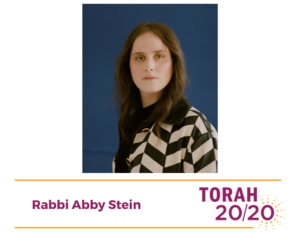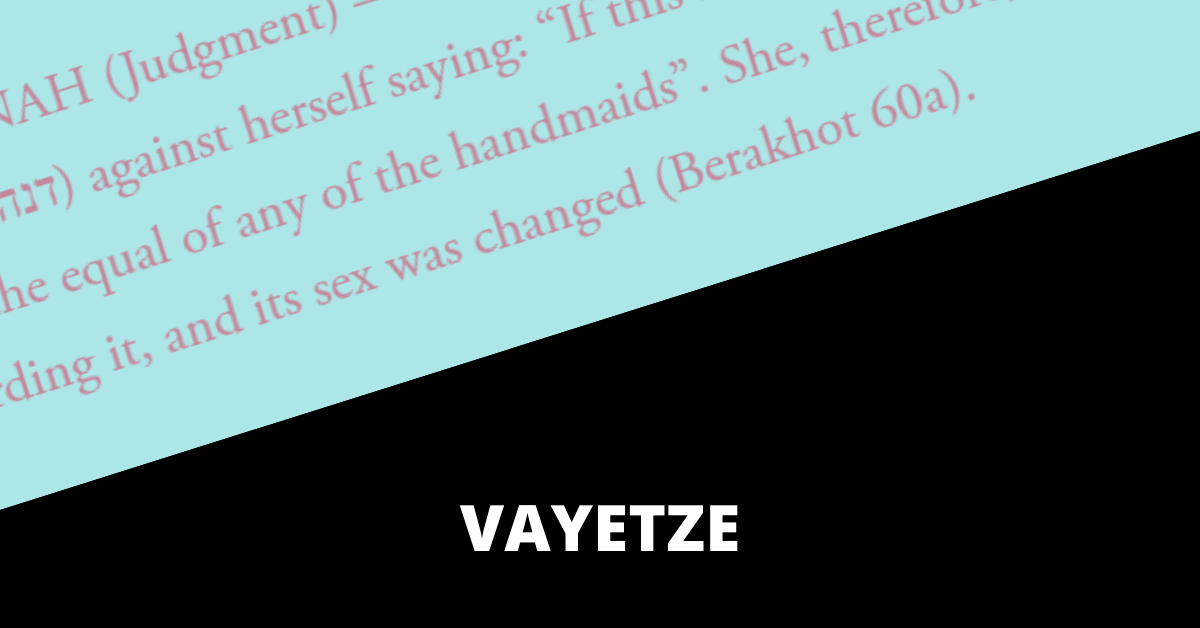A D’var Torah for Parshat Vayetze by Rabbi Abby Stein
Let’s talk about Dinah, Jacob’s only daughter, at least according to the story we are told in this week’s parshah:
“And then, she [Leah] gave birth to a daughter, and she called her Dinah [literally: Her Judgement].” (Genesis 30:21)
One of my early personal memories, a memory of forgetting what happened, is my Mommy walking in on me in the bathtub, as I was using safety pins to prick my most private body part. At the time, it did not make any sense to me. I was a girl, and that body part was a mistake in my eyes. I wanted to get rid of it, and if I couldn’t, I wanted to make ‘it’ feel pain.
“Bist meshuge gevorn?” my mom screamed at me in Yiddish when she ‘caught me.’ “Did you go crazy?”
“I am a girl, and it doesn’t belong there,” I said, pooling all the courage a four-year-old could muster into that comeback. Mommy looked confused, angry, and filled with motherly worry, all at once.
I might as well have gone crazy because I blacked out the next few minutes. To this day, all I remember is crying as my mom instilled the fear of God in me; or rather, the fear of one of the world’s most gender-segregated societies, the Hasidic community we were part of. I don’t remember what she said, but to this day I can feel the chills going through my body when I think back to that moment. One message was clear to me even then: you might be a girl, but you are alone in the world with that thought. Everyone thinks you are a boy — the firstborn son in a rabbinic family, destined to become a rabbi, and perhaps a rebbe. You can never share that thought with anyone. You cannot live like a girl.
Sign up to receive Torah 20/20 in your inbox each week.
Five years passed till I found the next possible glimmer of light. It was in 4th grade, on this week’s parshah, in the form of a Talmudic teaching (Berakhot 60.a) quoted by Rashi in his commentary on the above verse (Genesis 30:21):
Dinah. Our Rabbis explained that Leah set herself up as judge against herself [when she got pregnant again, with a boy], saying: “If this baby will be a son, my sister Rachel wouldn’t even be equal to one of the concubines.” So, she prayed on the baby boy, and it was changed into a girl.
That is to say, according the rabbis, Leah knew that Jacob would have only 12 boys, and there were already 10 — six born to Leah, two to Bilhah, and two to Zilpah — so for her sister’s dignity, this fetus had to be a girl.
As much as my 20-something-year-old self — the rebel and atheist who thought the Bible was mere fiction at best, and an outdated oppressive text at that — might not have liked to admit it, this verse and teaching saved me in some ways. It triggered in me a realization of one of the strongest messages I was raised with: Hashem (God) is all powerful, and with prayer we can ask for anything, and get it. And now, I had Rashi to back me up that it worked even on gender.
So I wrote a prayer in Yiddish (translated in full in my book, Becoming Eve, pages 28-29), with the second line being “Bashefer, ich veis di kenst tien ales in the velt” (Creator, I know that you can do anything), because hey, Rashi said so. I said that every night, and it is what kept me going for the next few years.
Ultimately, I turned into a rebellious teenager who was studying to become a rabbi and secretly planning to leave the community I was raised in. Praying to Hashem for help seemed useless and stupid, and I stopped.
Yet to this day it taught me a most valuable lesson: the power of representation. The power of one line in a teaching, sermon, saying of a teacher, or political statement. Because it might seem minor to so many, yet you never know who is going to be the nine-year-old who might find themselves in it.
Find more commentaries on Vayetze.
A few weeks ago, on Saturday night, I was watching President-elect Biden give his victory speech. In all honesty, yes, I was relieved that he won, but he was far from my first choice; I was a national surrogate for the Bernie campaign, and I am a card-carrying socialist, literally. On one hand, the past four years were torture to so many, and particularly to my transgender siblings, especially BIPOC [Black, Indigenous, People of Color] trans folks. At the same time, I know that our work has barely started. While we will now have someone we can hopefully push in the right (or rather, left) direction, he still wouldn’t support Medicare for all or a Green New Deal, end an unjust justice system, remove money from politics, and so much more.
I wanted to find something that Saturday night, in the President-elect’s speech, that I could unconditionally celebrate.
And I got it.
For the first time in U.S. history, the person elected to the highest office mentioned, and thanked, transgender people in his victory speech.
It was one word. Just one word. But I know that it means the world to so many.
Call me gullible, but I know for a fact that there is a nine-year-old somewhere who might just survive, because they know that there is someone up there who believes that who they are is possible. Who they are is worth mentioning.
I started crying.
Yes, we have a lot of work ahead of us. We need ultimately to get to a point where we don’t tolerate LGBTQ people: Tolerance is for nuts. Judaism teaches us that we need to celebrate people. But one of the messages I take away from my own experience with this week’s parshah is that a small teaching goes a long way.
For a moment, this is worth celebrating. Then, we get to work.
 Abby Stein is a rabbi, educator, author and activist. Raised in a Hasidic family, she is a direct descendent of its founder, the Baal Shem Tov, and was ordained in 2011. After leaving the Hasidic community and coming out as a woman of trans experience, she has given 400+ speeches around the world, raising awareness on LGBTQ issues in Judaism, antisemitism, media, and more. Her book, Becoming Eve, was published in 2019. In 2020 she was named by Prospect Magazine one of The World’s Top 50 Thinkers, and by The Jewish Forward as one of their Forward 50 most influential American Jews.
Abby Stein is a rabbi, educator, author and activist. Raised in a Hasidic family, she is a direct descendent of its founder, the Baal Shem Tov, and was ordained in 2011. After leaving the Hasidic community and coming out as a woman of trans experience, she has given 400+ speeches around the world, raising awareness on LGBTQ issues in Judaism, antisemitism, media, and more. Her book, Becoming Eve, was published in 2019. In 2020 she was named by Prospect Magazine one of The World’s Top 50 Thinkers, and by The Jewish Forward as one of their Forward 50 most influential American Jews.


